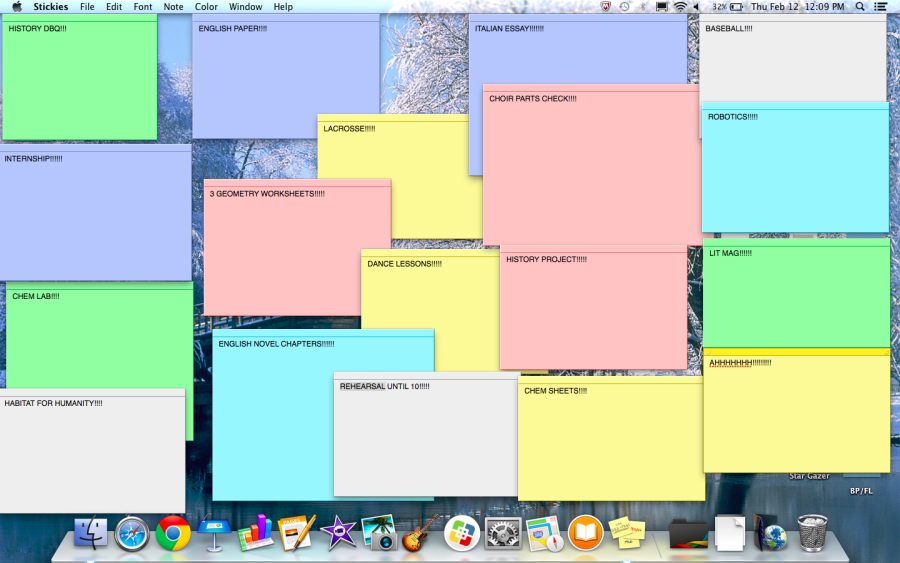Studies link homework to health issues
Picture this: You’ve had a long day at school, you’ve done all of your after school activities, and now all you want to do is just relax in front of the TV in your sweatpants.
There’s just one problem: you have homework.
The teachers have all heard it again and again: homework is stressful and annoying, but a necessary evil.
Or is it?
The Stanford Graduate School of Education conducted a survey with 4,300 students in 10 public and private high schools in California about homework. Through this survey, they came to one large conclusion: too much homework is causing high stress levels and health problems for students. It’s not just there, though; it’s actually in our own backyard. 56% of these students label homework as a primary stressor.
It’s not hard to imagine getting stressed out over math or science work after the stresses of a school day. We all know the symptoms: getting agitated easily, feeling overwhelmed, and feeling sorry for yourself. These are all things that just make us feel awful. All of this is unhealthy since it may cause stunted growth and the latest statistics are pretty grim: 29% of students spend 2 hours or more on homework daily in the U.S. Parents are starting to see it too. According to a new NPR conducted with the Robert Wood Johnson Foundation and the Harvard School of Public Health, almost 40% of parents say their high- schooler is experiencing stress from school. And kids certainly are trying to call out about their stress. According to the American Psychological Association, 45% of interviewed teens said they were stressed by school pressure.
Namely, homework.
In our school, due to block scheduling, students are now having some complaints.
Brian Sumereau, a sophomore, said, “When it comes to homework, everyone works at their own pace. It may cause stress if they take a long time. With the new block scheduling, the homework has decreased but the projects have increased, which causes more stress. ”
Jessica Deer, a junior, said, “Especially with the block scheduling, teachers fill the time with projects rather than lectures and class work.”
Though everyone may work at their own pace, many students feel the amount of work has become a lot this year with the new block schedule in place. Though teachers need to fill the time, the extensive work they assign conflicts with other teachers’ assignments, causing stress on the students. And with stress comes many health problems.
Going back to the study conducted by the Stanford Graduate School for Education, many students explained in open ended answers that they suffered from sleep deprivation, headaches, exhaustion, weight loss and stomach problems. All of these can be disastrous on the body and prove counterproductive for learning since no one can learn when they are too busy trying to stay awake.
Rebecca Silverman, a sophomore who is very passionate about this issue, said, “The school or, more specifically, the teachers, give way too much homework. Taking into account the fact some people have honors classes and honors classes tend to have more work, I can see why the teachers give us the workload they do. But that does not give them the right to make me and other students stay up until 2 in the morning and forget about our health to read a 14-page packet and do a worksheet.”
Most, if not all, students can agree with Silverman’s statement, and many professionals can agree that the lack of sleep for students our age can end badly for our health. Sleep deprivation can often cause depression in students since their exhaustion may cause them to feel helpless or worthless. Many experts recommend an 8-8-8 regimen: 8 hours work, 8 hours play, 8 hours rest.
Of course, they don’t seem to mention extracurriculars.
Whether it’s theater, sports, choir, or Glamor Girls, all extracurriculars are fun and allow kids to take time to do activities outside of school that they find worthwhile. But, homework doesn’t allow kids to relax and have fun. Instead, it causes them to stress and worry about the amount of work they have when they get home. It also stops kids from spending time with family and friends. The study from Stanford showed through the data and the open ended interviews that kids, due to too much homework, may not develop critical life skills or meet their developmental needs. They may drop activities, not spend time with family or friends, or stop doing the things they enjoy.
Samantha Brunn, a sophomore, said, ”You can’t even commit to your activities since you have so much homework. “
Others agreed with this statement.
“I definitely think the idea (of homework) is justified but not so much the amount, especially given that we have other activities to do,” said Ariana Aguero, another sophomore.
According to several studies and first-hand experience from students, homework takes away from the ability to participate in extracurricular activities and can compromise students’ health and relationships with their families and friends since it takes up so much time. It is widely known that family time and school related activities are important to students and allow them to relax and expose themselves to new experiences. After all, isn’t that what high school is considered to be about?








